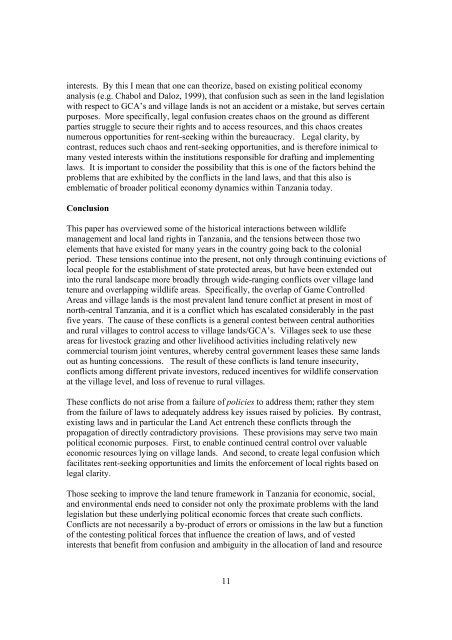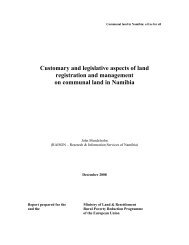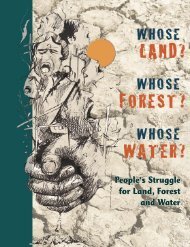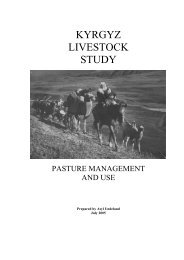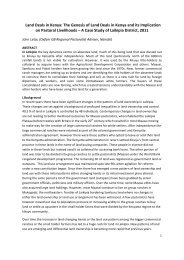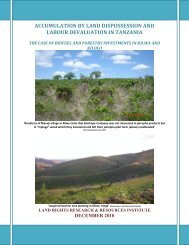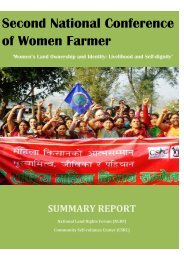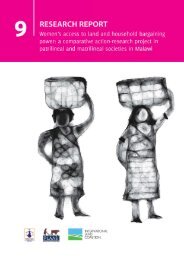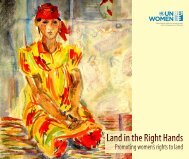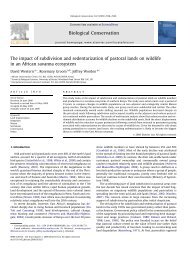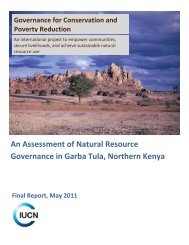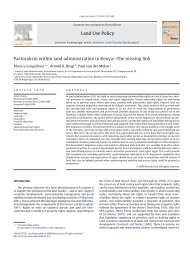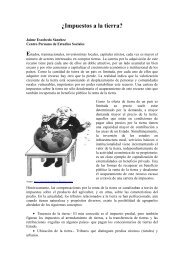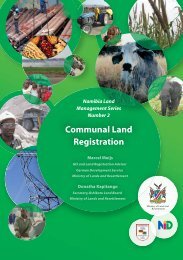Wildlife Management and Village Land Tenure in ... - Land Portal
Wildlife Management and Village Land Tenure in ... - Land Portal
Wildlife Management and Village Land Tenure in ... - Land Portal
You also want an ePaper? Increase the reach of your titles
YUMPU automatically turns print PDFs into web optimized ePapers that Google loves.
<strong>in</strong>terests. By this I mean that one can theorize, based on exist<strong>in</strong>g political economy<br />
analysis (e.g. Chabol <strong>and</strong> Daloz, 1999), that confusion such as seen <strong>in</strong> the l<strong>and</strong> legislation<br />
with respect to GCA’s <strong>and</strong> village l<strong>and</strong>s is not an accident or a mistake, but serves certa<strong>in</strong><br />
purposes. More specifically, legal confusion creates chaos on the ground as different<br />
parties struggle to secure their rights <strong>and</strong> to access resources, <strong>and</strong> this chaos creates<br />
numerous opportunities for rent-seek<strong>in</strong>g with<strong>in</strong> the bureaucracy. Legal clarity, by<br />
contrast, reduces such chaos <strong>and</strong> rent-seek<strong>in</strong>g opportunities, <strong>and</strong> is therefore <strong>in</strong>imical to<br />
many vested <strong>in</strong>terests with<strong>in</strong> the <strong>in</strong>stitutions responsible for draft<strong>in</strong>g <strong>and</strong> implement<strong>in</strong>g<br />
laws. It is important to consider the possibility that this is one of the factors beh<strong>in</strong>d the<br />
problems that are exhibited by the conflicts <strong>in</strong> the l<strong>and</strong> laws, <strong>and</strong> that this also is<br />
emblematic of broader political economy dynamics with<strong>in</strong> Tanzania today.<br />
Conclusion<br />
This paper has overviewed some of the historical <strong>in</strong>teractions between wildlife<br />
management <strong>and</strong> local l<strong>and</strong> rights <strong>in</strong> Tanzania, <strong>and</strong> the tensions between those two<br />
elements that have existed for many years <strong>in</strong> the country go<strong>in</strong>g back to the colonial<br />
period. These tensions cont<strong>in</strong>ue <strong>in</strong>to the present, not only through cont<strong>in</strong>u<strong>in</strong>g evictions of<br />
local people for the establishment of state protected areas, but have been extended out<br />
<strong>in</strong>to the rural l<strong>and</strong>scape more broadly through wide-rang<strong>in</strong>g conflicts over village l<strong>and</strong><br />
tenure <strong>and</strong> overlapp<strong>in</strong>g wildlife areas. Specifically, the overlap of Game Controlled<br />
Areas <strong>and</strong> village l<strong>and</strong>s is the most prevalent l<strong>and</strong> tenure conflict at present <strong>in</strong> most of<br />
north-central Tanzania, <strong>and</strong> it is a conflict which has escalated considerably <strong>in</strong> the past<br />
five years. The cause of these conflicts is a general contest between central authorities<br />
<strong>and</strong> rural villages to control access to village l<strong>and</strong>s/GCA’s. <strong>Village</strong>s seek to use these<br />
areas for livestock graz<strong>in</strong>g <strong>and</strong> other livelihood activities <strong>in</strong>clud<strong>in</strong>g relatively new<br />
commercial tourism jo<strong>in</strong>t ventures, whereby central government leases these same l<strong>and</strong>s<br />
out as hunt<strong>in</strong>g concessions. The result of these conflicts is l<strong>and</strong> tenure <strong>in</strong>security,<br />
conflicts among different private <strong>in</strong>vestors, reduced <strong>in</strong>centives for wildlife conservation<br />
at the village level, <strong>and</strong> loss of revenue to rural villages.<br />
These conflicts do not arise from a failure of policies to address them; rather they stem<br />
from the failure of laws to adequately address key issues raised by policies. By contrast,<br />
exist<strong>in</strong>g laws <strong>and</strong> <strong>in</strong> particular the L<strong>and</strong> Act entrench these conflicts through the<br />
propagation of directly contradictory provisions. These provisions may serve two ma<strong>in</strong><br />
political economic purposes. First, to enable cont<strong>in</strong>ued central control over valuable<br />
economic resources ly<strong>in</strong>g on village l<strong>and</strong>s. And second, to create legal confusion which<br />
facilitates rent-seek<strong>in</strong>g opportunities <strong>and</strong> limits the enforcement of local rights based on<br />
legal clarity.<br />
Those seek<strong>in</strong>g to improve the l<strong>and</strong> tenure framework <strong>in</strong> Tanzania for economic, social,<br />
<strong>and</strong> environmental ends need to consider not only the proximate problems with the l<strong>and</strong><br />
legislation but these underly<strong>in</strong>g political economic forces that create such conflicts.<br />
Conflicts are not necessarily a by-product of errors or omissions <strong>in</strong> the law but a function<br />
of the contest<strong>in</strong>g political forces that <strong>in</strong>fluence the creation of laws, <strong>and</strong> of vested<br />
<strong>in</strong>terests that benefit from confusion <strong>and</strong> ambiguity <strong>in</strong> the allocation of l<strong>and</strong> <strong>and</strong> resource<br />
11


